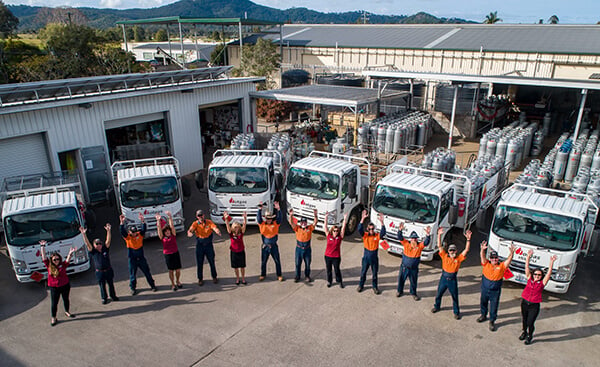Safety & Gas Leaks

If you suspect you have an LP Gas leak and can smell gas,
turn off your appliances and gas cylinders as soon as possible
IMPORTANT: IF THERE IS A RISK TO YOURS OR OTHER’S LIFE – CALL 000 IMMEDIATELY
Otherwise, call us on 07 5446 8777 to speak with our team during business hours OR
if after hours, press 2 and leave your details and we will contact you urgently
Hotgas Safety Guarantee
Hotgas is committed to ensuring the safety of their staff, customers and their premises. Staff are trained in correct safety procedures for the transportation, handling, installation (connection and disconnection) of the cylinders delivered to your premises. All cylinder connections are tested for leaks and you will be informed if any safety concerns are identified
Gas Leaks
Gas leaks are rare however are possible and can occur for a variety of reasons. Leaks outside the home may happen when the connections become loose or cracked, or the gas system regulator starts to fail (for example). In even rarer cases, leaks may occur (both internal and external to the premise) if there is a rupture to the pipework or an appliance wears out. Often a gas leak presents itself with a strong smell of gas, or possibly an audible ‘hissing’ sound.
Either way, if you suspect you have an LP Gas leak and can smell gas, we recommend you turn off your appliances and turn off the gas cylinders immediately. By doing so, you will isolate the fuel source and limit potential risk until investigated.
Then give us (or your current supplier) a call. We may suggest that you call a licensed Gas Fitter to inspect your installation as soon as possible for safety reasons. Remember, be safe not sorry.
What to do if you smell gas
Your cylinder may not be leaking even if you can smell gas. It may just be close to empty, as there is an odorant added to LPG and the gas at the bottom smells stronger. The odorant is added to LPG because it is a naturally odourless gas.
Check:
- Pilot lights on your appliances – the flame may have blown out
- Burners on your stove – they may be on, without a flame
- Connections to your gas cylinder, gas appliances and equipment
- Never use a naked flame to detect a leak. Spray soapy water on connections to check for leaks – if bubbles appear, check connections. Always rinse any soapy water away after leak testing. If in doubt, turn off the gas and have a licensed gas fitter attend to the installation
Safety Data Sheet (SDS) information for handling and First Aid at
Liquefied petroleum gas (LPG) SDS.
What to do if you think you have a gas leak?
IMPORTANT: If there is a risk to yours or other’s life, call 000 immediately
- Do not smoke
- Do not use any electrical appliance, use the phone or switch on a light. These are sources of ignition and may create a spark which can ignite the gas in the atmosphere
- Open all windows and doors
- Do not light a match, lighter or any other source of open flame
- Then give us (or your current supplier) a call for further advice

